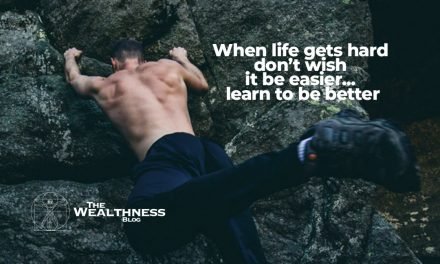Life’s challenges are an inevitable part of the human experience. When faced with difficulties, it’s natural to wish for an easier path. However, the true path to growth and fulfillment lies not in wishing for easier circumstances, but in developing the strength and skills to overcome challenges. This philosophy encourages resilience, personal growth, and a proactive approach to life’s obstacles.
The Nature of Adversity
Adversity is an inherent part of life. It comes in many forms – personal setbacks, professional challenges, health issues, relationship problems, or global crises. While these difficulties can be daunting, they also present opportunities for growth and self-improvement.
Psychologists and researchers have long studied the impact of adversity on human development. Studies have shown that moderate levels of adversity can lead to greater resilience, improved problem-solving skills, and enhanced emotional regulation. This phenomenon, known as stress-induced growth or post-traumatic growth, suggests that facing and overcoming challenges can lead to positive personal development.
The Pitfall of Wishing for Easier Circumstances
When life gets hard, the natural inclination is often to wish for easier circumstances. This response, while understandable, can be counterproductive for several reasons:
- It fosters a victim mentality: Constantly wishing for easier circumstances can lead to a sense of helplessness and victimhood.
- It’s unrealistic: Life will always have challenges. Wishing them away doesn’t change reality.
- It wastes energy: The energy spent wishing for different circumstances could be better used in addressing the current situation.
- It stunts growth: By avoiding challenges, we miss out on opportunities for personal development and skill-building.
The Power of Learning to Be Better
Instead of wishing for easier circumstances, focusing on personal growth and skill development offers numerous benefits:
- Increased resilience: By facing challenges head-on, we build emotional and mental resilience.
- Improved problem-solving skills: Each obstacle overcome enhances our ability to tackle future challenges.
- Greater self-efficacy: Successfully navigating difficulties boosts our confidence in our abilities.
- Personal growth: Overcoming challenges often leads to significant personal development and self-discovery.
- Adaptability: Learning to be better in the face of adversity makes us more adaptable to change.
Strategies for Learning to Be Better
- Embrace a Growth Mindset
Carol Dweck’s research on mindset demonstrates the power of believing that our abilities can be developed through dedication and hard work. Adopting a growth mindset means viewing challenges as opportunities to learn and grow, rather than insurmountable obstacles.
- Practice Self-Reflection
Regular self-reflection allows us to learn from our experiences. After facing a challenge, take time to consider what you learned, what you could have done differently, and how you’ve grown from the experience.
- Seek Knowledge and Skill Development
Continuously expanding your knowledge and skills equips you to handle a wider range of challenges. This could involve formal education, reading, taking courses, or learning from mentors and peers.
- Cultivate Emotional Intelligence
Developing emotional intelligence – the ability to recognize, understand, and manage our own emotions and those of others – is crucial for navigating life’s challenges effectively.
- Build a Support Network
Surrounding yourself with supportive, growth-oriented people can provide encouragement, advice, and different perspectives when facing difficulties.
- Practice Resilience-Building Techniques
Techniques such as mindfulness meditation, cognitive reframing, and stress management exercises can help build mental and emotional resilience.
- Set Challenging Goals
Regularly setting and working towards challenging goals helps build the skills and confidence needed to overcome life’s obstacles.
- Embrace Failure as a Learning Opportunity
Reframe failures as valuable learning experiences. Analyze what went wrong, what you can learn from it, and how you can improve in the future.
Real-Life Applications
This philosophy of learning to be better in the face of adversity can be applied in various life domains:
- Career Challenges: Instead of wishing for an easier job, focus on developing new skills, improving your work processes, or learning better stress management techniques.
- Relationship Difficulties: Rather than wishing for a perfect partner, work on improving your communication skills, emotional intelligence, and understanding of healthy relationship dynamics.
- Health Issues: While it’s natural to wish for better health, focus on what you can control – learning about your condition, adopting healthier lifestyle habits, or developing coping strategies.
- Financial Struggles: Instead of wishing for more money, focus on improving your financial literacy, developing new income streams, or learning better budgeting skills.
- Global Crises: In the face of large-scale challenges like pandemics or climate change, focus on educating yourself, adapting your lifestyle, and finding ways to contribute positively to solutions.
The Role of Perspective
A crucial aspect of learning to be better is maintaining perspective. This involves:
- Recognizing that challenges are temporary and part of a larger life journey.
- Understanding that difficulties often lead to unexpected positive outcomes.
- Appreciating the growth and learning that come from overcoming obstacles.
- Realizing that everyone faces challenges, and comparing your struggles to others’ is often unproductive.
Balancing Acceptance and Action
While the focus is on learning to be better, it’s also important to balance this with acceptance. Some circumstances are beyond our control, and learning to accept what we cannot change is as important as working to improve what we can. The wisdom to know the difference, as highlighted in the Serenity Prayer, is a crucial life skill.
Conclusion
The philosophy of learning to be better when life gets hard is a powerful approach to personal growth and resilience. It shifts our focus from external circumstances to internal development, empowering us to take control of our responses to life’s challenges.
By embracing this mindset, we transform obstacles into opportunities, setbacks into stepping stones. We develop not just the skills to overcome current challenges, but the resilience and adaptability to face future ones with confidence.
This approach doesn’t promise an easy life – challenges will always exist. What it offers instead is the opportunity for a rich, fulfilling life characterized by continuous growth, resilience, and the satisfaction of overcoming difficulties.
As we face life’s hardships, let us remember that our greatest growth often comes from our greatest challenges. By choosing to learn and improve rather than wishing for easier circumstances, we not only navigate current difficulties more effectively but also prepare ourselves for whatever life may bring in the future.
In essence, this philosophy encourages us to be active participants in our own development, to see every challenge as an opportunity for growth, and to continuously strive to be better versions of ourselves. It’s a path that leads not just to overcoming life’s hardships, but to a deeper, more meaningful engagement with life itself.











